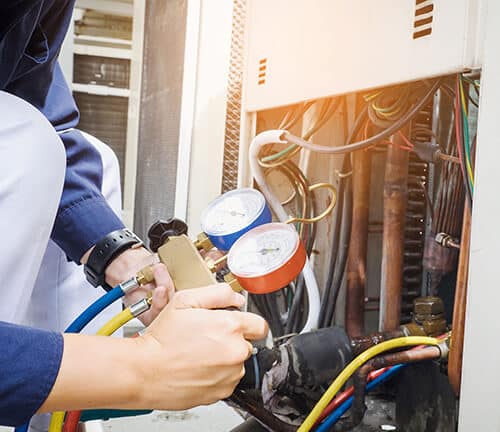Common AC Problems in Summer

During summer, you might need to run your AC for extended periods to keep up with the high temperatures. This can expose your unit to wear and tear, and when neglected, the air conditioner will eventually fail. A damaged AC in the middle of the hot season can make you very uncomfortable and compromise your health. Therefore, you need to know some basic signs of AC malfunction and how to fix them to avoid frustrating breakdowns. Look out for the following issues.
1. The AC Might Not Turn On
Imagine waking up, turning on your unit only to realize that it isn’t responding. Your AC may fail to turn on if there is a problem with the thermostat. Check to confirm whether the AC is receiving the proper instructions from the thermostat and, if it’s not, set it to cool. If it still fails to respond, check the thermostat’s batteries and replace them. Sometimes, this problem can also happen due to a tripped circuit breaker. Turn the switch to the off position, then back to the on position to reset the circuit breaker.
2. The Unit Fails to Blow in Cool Enough Air
If your air conditioner turns on, but it isn’t cooling, you might be having a dirty filter. Turn off your AC and locate the air filters, usually at the return duct, but check all vents since some units might have multiple filters. Unscrew the access panel and take out the filter. Confirm from the manufacturer’s manual whether you have a disposable or washable filter. If it’s disposable, throw away the old one and fit back a new filter. If your unit has a washable filter, vacuum it to suck up loose dirt, soak it in equal parts of water and vinegar, rinse, dry, and fit it back.
Your unit won’t blow in cool air if there are obstructions that limit airflow. You can improve airflow by clearing off any obstacles near the vents. Also, have a technician check through the ductwork for leaks that could be causing air to seep out. If the AC doesn’t blow air at all, you could be dealing with a worn-out blower belt that needs replacement.
3. The AC May Freeze Up
Ice particles on any part of the unit is a sign of your unit freezing up. When you put your hands on the vent, such a unit will only blow warm air. The main cause of an AC freezing is blocked airflow. If warm air stops flowing over the cold evaporator coils while the compressor is still running, the moisture drawn from the indoor air is more likely to freeze. Another cause of this issue is blocked or collapsed duct. A clogged air filter also restricts airflow, so clean or change it every three months and monthly for those living in dusty regions.
When the blower motor fails, the air stops flowing over the coils quickly, so they start freezing up. Low refrigerant levels cause a drop in pressure in the evaporator coils, allowing moisture to accumulate and freeze. When you notice that your AC is freezing up, turn the unit off to let the ice thaw. Next, restore power to the system, and turn on the blower to circulate air around the coils to dry them. If this won’t solve the problem, call an HVAC technician to assess the issue and advise you on the best course of action.
4. AC Running Consistently
It’s normal for your AC to run for a longer period of time, especially on hotter days. However, it should cycle for 15 to 20 minutes three times an hour. If your unit runs non-stop, your thermostat may not be working correctly, in that it doesn’t signal the AC to stop once it attains the desired temperature. This can lead to vital components wear and high utility bills. So, consider replacing the faulty thermostat.
Dirty coils can also cause your AC to run continuously. You can clean the coils using the no-rinse coil cleaner. Keeping your air filters clean will also help prevent debris from reaching the evaporator coils. For the outdoor unit, clear off any leaves, sticks, grass, and tall plants growing nearby.
An undersized AC will also need to run longer to keep up with the cooling demands. Have a professional size your unit considering the size of the house, the design, room’s occupancy, number of heat-generating appliances, and the climatic conditions in your region.
5. The AC’s Circuit Breaker Trips Frequently
If your AC trip repeatedly, then there is a problem with the electrical components. The breaker trips when it draws in more power than it’s intended for. This issue may arise due to incorrect installation. The solution here is to work with certified technicians to reinstall the unit and restore its functionality. Loose wiring, fan motor malfunction, compressor failure, and power surge can also cause the circuit breaker to trip.
6. AC Making Strange Noises
Be wary of any unusual sounds coming from your AC. A banging noise is a sign of loose or broken components within the compressor. Unfortunately, if you have a malfunctioning compressor, you might need to buy a new one or replace the entire unit. Clanking sound means that the indoor blower or outdoor fan blade could be out of balance.
A squealing sound indicates that the fan belt could be misaligned or worn out. Your AC can make screeching noises in case of a refrigerant leak. Once you hear such noises, call a technician immediately. The longer you leave such an issue unchecked, the more extensive the problem can grow.
7. Bad Odors Coming From the System
If your AC smells like dirty socks, then you are dealing with a clogged AC drainage system. You should clean your drainpipe and condensate pan to clear the clog and prevent algae growth. If you smell fumes coming from the exhaust, it probably means that the fluids in your AC are leaking.
If your AC produces a rotten egg smell, it indicates a refrigerant leak. This is very dangerous and can put your family members’ health at risk. A moldy odor signifies the growth of molds and mildew in or near your AC that can trigger allergic reactions and asthmatic attacks. If you notice any such smells, call a professional to get rid of them immediately.
Contact the Experts to Have Your AC Problems Fixed Right Away
In the dormant period, the AC’s components can loosen or accumulate dust and debris, which affect its performance. Therefore, plan for preventive maintenance before the beginning of the summer season to keep your AC in working order. During tune-ups, the technician will check the thermostat settings, clean the coils, change the air filters, lubricate moving parts, clean the condensate line, and recharge the refrigerant. Such practices can help prevent most of the problems outlined above.
If your AC requires professional repairs or tune-ups, contact Brennan Heating & Air Conditioning. We offer cooling and heating systems installation, repair, and maintenance services. Our company also provides air duct cleaning, heat pump installation, and electric services in Seattle, WA, and the nearby areas. Call our friendly team today or schedule an appointment online.







